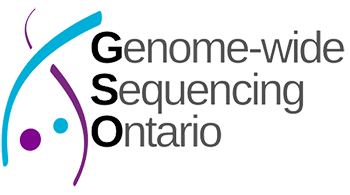GSO is committed to advancing the knowledge of rare diseases and improving the care of patients in Ontario and across Canada. GSO may in the future initiate or partake in research studies to this aim. GSO may also facilitate contact between scientists with approved research studies to patients and families who wish to learn about research opportunities.
Patients who receive genome-wide sequencing (GWS) through GSO can indicate their preference regarding possible contact relating to potential research opportunities on the GSO Acknowledgement form. If a patient agrees to be contacted for research, GSO may contact them directly to present them with research opportunities. Research may include additional data-sharing opportunities to better understand rare diseases, or to participate in natural history studies, clinical trials, or health services research.
Current GSO research studies
Secondary Findings Impact Study
As GWS can look at all of a person’s genes, this test can identify variants in genes that are not related to the primary medical conditions for which the test has been offered, but which can cause other medical conditions during childhood and/or later in life. These variants are known as medically actionable secondary findings because there are clear medical recommendations that can be made to reduce the risk that they will impact a person’s health in the future. For the past five years, Ontario patients undergoing GWS have had the option to receive medically actionable secondary findings as defined by the ACMG.
Despite the regular offer of medically actionable secondary findings during GWS, there is still considerable international debate about how to clinically manage secondary findings generated through genomic sequencing. Existing literature suggests:
- Patients are interested in receiving secondary findings of all types, when asked both hypothetically and in actual testing scenarios. However, some express concern related to the burden of this information and some raise questions related to the optimal timing of receiving this information.
- Clinicians have mixed views on whether and which secondary findings should be sought and reported. Among those who express concerns, concerns relate to workload, interpretability (i.e., penetrance), equity, long-term benefit, and allocation of scarce resources.
In addition to the published literature, a recent survey of Ontario geneticists and genetic counsellors found a majority of providers felt that continuing to offer reporting of secondary findings when GWS is performed in province is necessary for appropriate care in Ontario. Providers also raised concerns about medically actionable secondary findings, specifically regarding the clinical utility, equity of practice, and the cost to the Ontario health-care system.
More evidence is needed to inform decisions about how clinicians should manage secondary findings as genomic sequencing is incorporated into clinical practice. Such evidence would help inform clinical practice as well as government policy decision-making.
To address this need, this project will leverage GSO’s sequencing and reporting operations to generate an evidence base for clinical practice and policy decision making. The Secondary Findings Impact Study will seek to determine the impact of reporting secondary findings on:
- laboratory services
- clinical genetics professionals and other implicated medical providers
- probands and family members who receive secondary variants compared to those who receive negative secondary variant reports
- downstream costs to the health care system
GSO’s Secondary Findings Impact Study will be looking to recruit patients both with or without a reported secondary finding from across the province. The GSO team will be reaching out to all clinical sites in Ontario to discuss implementing this important study.
Please check back here to learn about future research opportunities.

